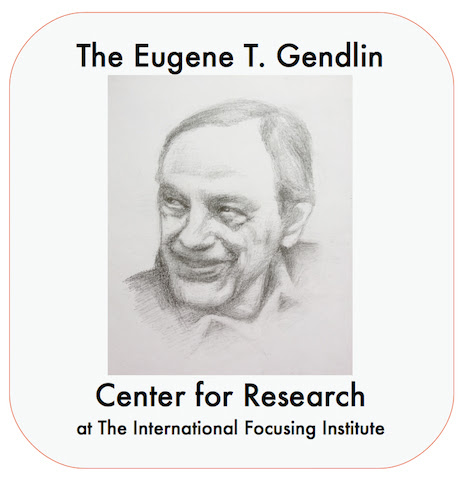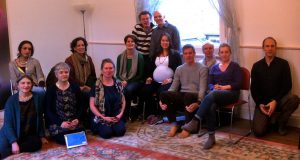Exciting New Research on Focusing
by Leslie Ellis
In 2019, Siebrecht Vanhooren of KU University Leuven was the first recipient of the Gendlin Grant, funded by your donations
By making a regular daily practice of checking in with your bodily felt sense of the various life situations you encounter allowing this felt sense to guide your decisions, you are more likely to experience satisfaction with life and less likely to experience distress and existential anxiety. Such are the conclusions supported by a recent study that surveyed 385 Dutch-speaking participants about their experience with Focusing.
The study (Vanhooren, Grosemans & Breynaert, 2021) is the first publication among several being conducted by a research group focused on meaning and existence in the context of clinical and existential psychology. The group, led by Dr. Siebrecht Vanhooren (pictured), is based at KU Leuven, the top research university in Belgium. The study received funding from The International Focusing Institute through the Gendlin Grant administered by The Eugene T. Gendlin Center for Research in Experiential Philosophy and Psychology.
 This cross-sectional study begins with this statement: “Making sense of our existence is one of the most demanding aspects of being human. Studies have shown that meaning is robustly associated with well-being and mental health.” Vanhooren was able to support his main hypotheses that to the degree that one adopts a Focusing attitude (defined as the practice of contacting one’s felt sense), one would experience greater life satisfaction and less distress and existential anxiety. The researchers also successfully predicted that this collection of positive effects is partially mediated by the experience of meaning. What surprised Vanhooren was that while the Focusing attitude alone strongly affected all three outcome variables, the mediating effect of meaning in life was not as strong as expected.
This cross-sectional study begins with this statement: “Making sense of our existence is one of the most demanding aspects of being human. Studies have shown that meaning is robustly associated with well-being and mental health.” Vanhooren was able to support his main hypotheses that to the degree that one adopts a Focusing attitude (defined as the practice of contacting one’s felt sense), one would experience greater life satisfaction and less distress and existential anxiety. The researchers also successfully predicted that this collection of positive effects is partially mediated by the experience of meaning. What surprised Vanhooren was that while the Focusing attitude alone strongly affected all three outcome variables, the mediating effect of meaning in life was not as strong as expected.
Of all the Focusing variables considered, (Focusing training, partnership, frequency, perceived impact on one’s life and Focusing attitude) it was the Focusing attitude that had the strongest positive associations with life satisfaction and the strongest negative associations with distress and existential anxiety. The study also supported the suggestion that Focusing can be learned via training, and that Focusing partnership needs further study as, surprisingly, this was the one variable negatively related to life satisfaction.
The other surprise for Vanhooren was the large effect size between Focusing frequency and the perceived impact of Focusing on one’s life. He speculated that Focusing might be a self-motivating process saying, “Once you are aware of the impact Focusing has on your life, it could stimulate you to do more of it.” He said this has implications for how Focusing training is conducted. “We are trying to find ways to help people focus more frequently, even in small ways, and also to become more aware of the impact it has in their daily lives.”
This study is the first of several underway in Vanhooren’s lab. Other research projects in various stages of progress include:
• a pilot study with 77 participants on Focusing, meaning in life, existential concerns and depression
• a MOOC (massive open online course) study on Focusing, meaning in life, existential concerns and depression
• a mixed-method study on experiential-existential group therapy with cancer patients • a longitudinal study on the effect of Focusing training on life satisfaction, meaning in life, existential concerns and mental distress
When asked what the overall mission of his research is, Vanhooren said, “We in the person-centered, Focusing-oriented and existential therapies have a big role to play now and in the future, especially around helping with the existential concerns of people.” This meaningful area, made more relevant as the entire world wrestles with the experience of a global pandemic, is one that these approaches have been shown to be most helpful with. “We can help people get to their core issues more quickly, and to help those suffering from death anxiety and a sense of meaninglessness.”
One of the biggest takeaways is that adopting a Focusing attitude in everyday life has many beneficial effects, in particular around the biggest questions – those of life and death, and existential meaning. Vanhooren suggests we might adopt a deliberate practice of checking in with ourselves as part of our daily routine and encourage our patients to do the same. This simple act may have far-reaching and profoundly helpful effects.
This research was made possible by your generous donations to the Gendlin Research Center. Please help us to continue to support this kind of valuable work.
Reference
Vanhooren, S., Grosemans, A., & Breynaert, J. (Accepted, May 2021). Focusing, felt sense, and meaning in life. Person-centered & Experiential Psychotherapies.




